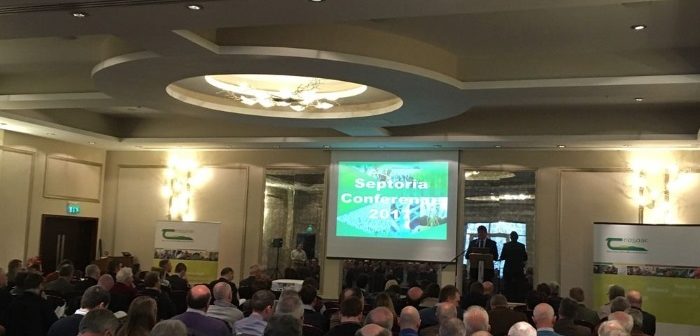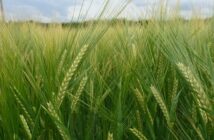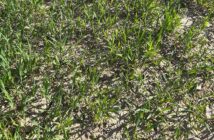A conference on Septoria disease in wheat in Dunboyne, County Meath, on Wednesday, 22 March, organised jointly by Teagasc, The Department of Agriculture, Food and the Marine, and the Irish Farmers Journal, was officially opened by Andrew Doyle, T.D., Minister of State at the Department of Agriculture, Food and the Marine.
Speaking at the opening of the Conference Minister Doyle said: “I would like to affirm my Departments commitment to the arable sector by highlighting the fact that we have invested significant funding into primary crop research, integrated pest management and other related topics. Many of these research projects are multidimensional and involve international partners. It makes sense to collaborate with other countries and institutions whether it is in problem solving, or assessing pioneering and innovative crop protection techniques.”
Head of the Teagasc Crop Science Research Department, John Spink said: “The conference brings together Irish and European crop disease control experts to discuss the future control of Septoria, the most damaging wheat disease in Ireland and north western Europe. The conference is focussed on understanding resistance development and on promoting the measures that should help to reduce disease pressure in crops”
The conference was prompted by the discovery in 2016 by Steven Kildea, Teagasc plant pathologist, of Septoria isolates in the field with mutations conferring resistance to the SDHI group of fungicides; these fungicides have been the mainstay of disease control since he discovered mutations affecting the triazole group of fungicides in 2009. This same resistance to the fungicides have since been found elsewhere in Europe.
The conference focussed on, not just the sustainable use of existing fungicides, but the prospects for future disease control options, including new fungicides and more resistant varieties.
The need for more resistant wheat varieties was highlighted by Ethel White of AFBI and Joseph Lynch, a post-doctoral researcher in Teagasc, who have been looking at the value of Septoria resistance for the development of more sustainable production systems. The integration of these varieties with other agronomic practices such as rotation and sowing date was discussed by Tom McCabe from UCD and Stephen Harrison, an AICC agronomist from the south west of England.



